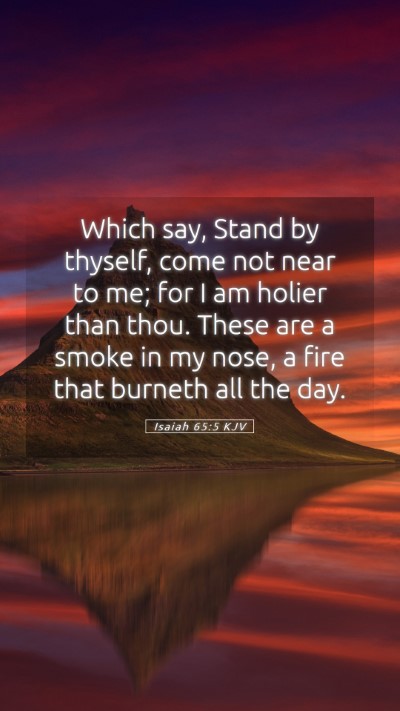Bible Verse Meaning: Isaiah 65:5
Isaiah 65:5 states: "Which say, Stand by thyself, come not near to me; for I am holier than thou. These are a smoke in my nose, a fire that burneth all the day."
Summary of Interpretation
This verse represents a stern warning against hypocrisy and self-righteousness, indicating that those who claim a higher status of holiness often alienate others while inciting divine displeasure.
Biblical Exegesis and Commentary Insights
Matthew Henry's Commentary
Matthew Henry underscores that the attitude displayed in this verse revolves around a disdainful superiority complex among the people addressed by the prophet. They perceive themselves as worthy and righteous, while they aggressively reject those they consider unclean or sinful. This reflects a broader theme within the Biblical narrative, emphasizing the necessity of humility and the dangers of a judgmental spirit.
Albert Barnes' Notes
Albert Barnes highlights that this is a critique of the religious leaders and the community's self-righteousness. They not only separate themselves from what they consider unholy but also project an image of piety that is inconsistent with true godliness. Barnes also elaborates on the metaphor of being a "smoke in God's nose"; he notes that such arrogance is offensive, invoking God's anger and leading to inevitable judgment.
Adam Clarke's Commentary
Adam Clarke offers insight into the idiomatic expression used in this verse, recognizing its cultural context. He explains that the self-righteous individuals being referred to are at risk of falling into the trap of being hypocritical. Clarke stresses that God prefers a humble spirit over ostentatious displays of piety, thus underscoring the futility of such prideful attitudes.
Application and Significance
This verse challenges believers to examine their own attitudes towards others, particularly the inclination to judge or separate oneself from those perceived as sinful. Instead, a call for humility and compassion is evident throughout the Biblical teachings.
Related Themes in Scripture
- Luke 18:9-14: The Parable of the Pharisee and the Tax Collector – a powerful illustration of self-righteousness.
- James 4:6: "God resists the proud, but gives grace to the humble."
- Matthew 7:1-5: "Judge not, that you be not judged" – emphasizing the need for self-examination before judging others.
Insights for Bible Study
When engaging in Bible study groups or personal Bible study, this verse provides a great launching point for discussions on self-righteousness, humility, and true holiness. Utilizing various Bible study tools and Bible study guides can enhance understanding of these themes.
Conclusion
In summary, Isaiah 65:5 serves as a caution against the perils of arrogance and self-exaltation, encouraging believers to embody the humility that aligns with God's heart. It invites further reflection on personal conduct in relation to others and highlights the importance of seeking genuine righteousness rather than a facade of holiness.


